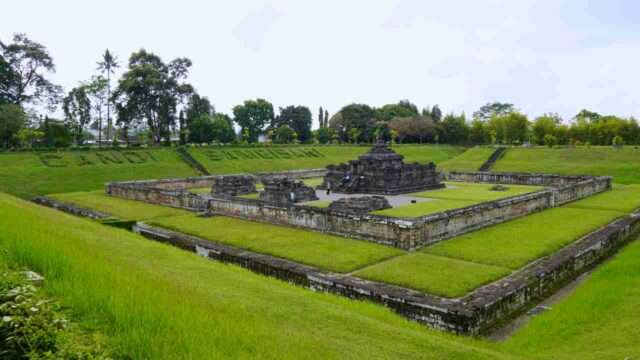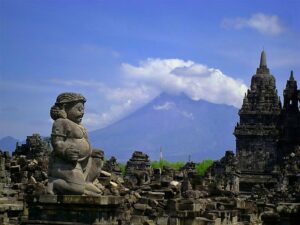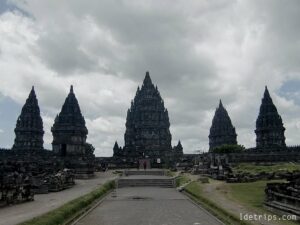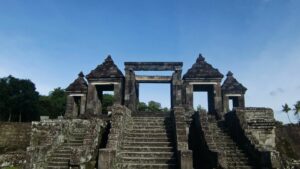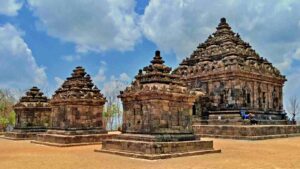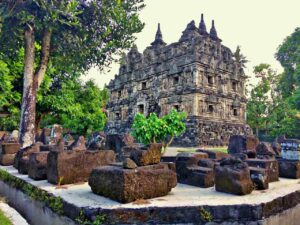Temple is a replica of God’s dwelling place used by believers to worship. Nowadays, temples are also tourist destinations frequented by thousands of people of any religion. Sambisari Temple is one of the immovable cultural heritages Indonesia possesses.
The temple is a historical relic of King Rakai Garung that ruled the ancient Mataram Kingdom from the Sanjaya dynasty. Based on the information in Wanua Tengah III’s inscription, the king ruled Medang at the beginning of the 9th century.
A gold plate scripture found on the site reads “om shiva shtana” which means “Honor, the construction of (dwelling) place for God Shiva”. During its excavation and rehabilitation, there were some separate findings at the site: foreign ceramics, earthenware, bones, bronze items, an andesite female statue, a bronze Bodhisattva statue, a scripture golden plate, and yoni.
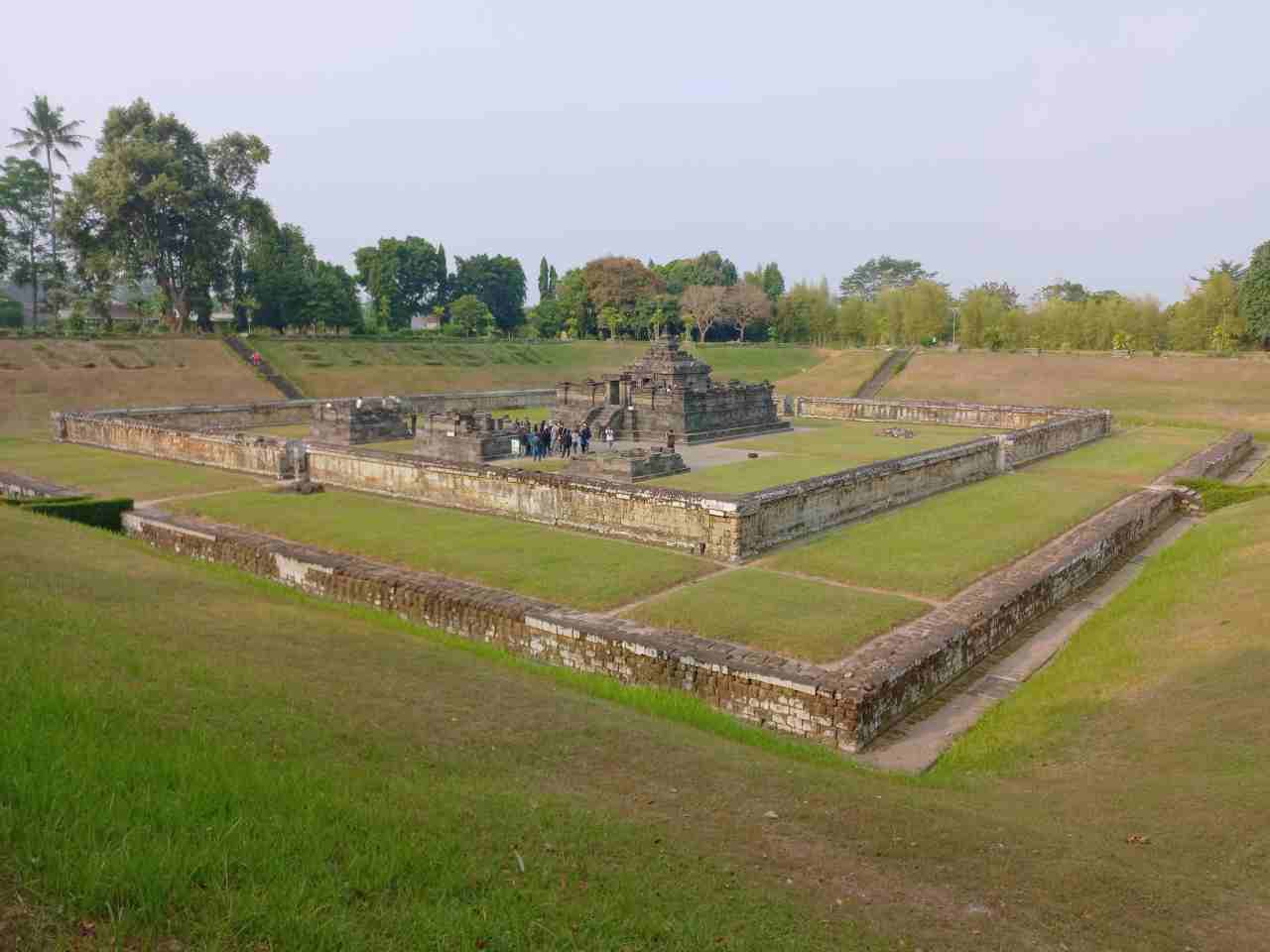
Sambisari Temple Entrance Fee
Compare to other prominent temples in Yogyakarta, Sambisari Temple charges a cheap entrance ticket. International tourists will only need to pay Rp15.000 ($1) for the ticket.
| Sambisari Temple Entrance Fee | |
| International tourists | Rp15.000 |
Nearby: Prambanan Temple, Guide To Explore and Use Public Transport.
Sambisari Temple Opening Hours
The temple is open every day except on Monday from 7 AM to 5 PM. The best time to visit the Sambisari temple is in the morning. People love to feel brisk in the surrounding air while enjoying the morning here. Or, feel the warmth of the glorious sunset on the skin in the afternoon. Be under the shade of the gazebo since it is hot and uncomfortable at midday.
| Sambisari Temple Opening Hours | |
| Every day, closed on Monday | 07:00 – 17:00 |
See: Guide To Explore Kalasan Temple, Yogyakarta & Ticket.
Access To Sambisari Temple
It is not hard getting here since Sambisari temple situates within a residential area. It is not on the main road, though. But the road is wide enough to accommodate a bus. Nevertheless, in high season, the road is not enough to accommodate the crowd.
Getting to the main temple takes tourists to climb stairs. Pay attention to the steps. The temple situates on the north side of the Indonesian Air Force Academy and Adi Sutjipto Airport. Sambisari Temple is only 4 km away the west of Kalasan Temple.
Sambisari’s Temple History & Unique Situation
It is not until 1966 that the temple came into existence. Mt. Merapi eruption in 1006 buried the temple 6.5 meters underneath volcanic material. A farmer discovered this temple accidentally in 1966 when hand-plowing his land. The hoe accidentally hit a rock.
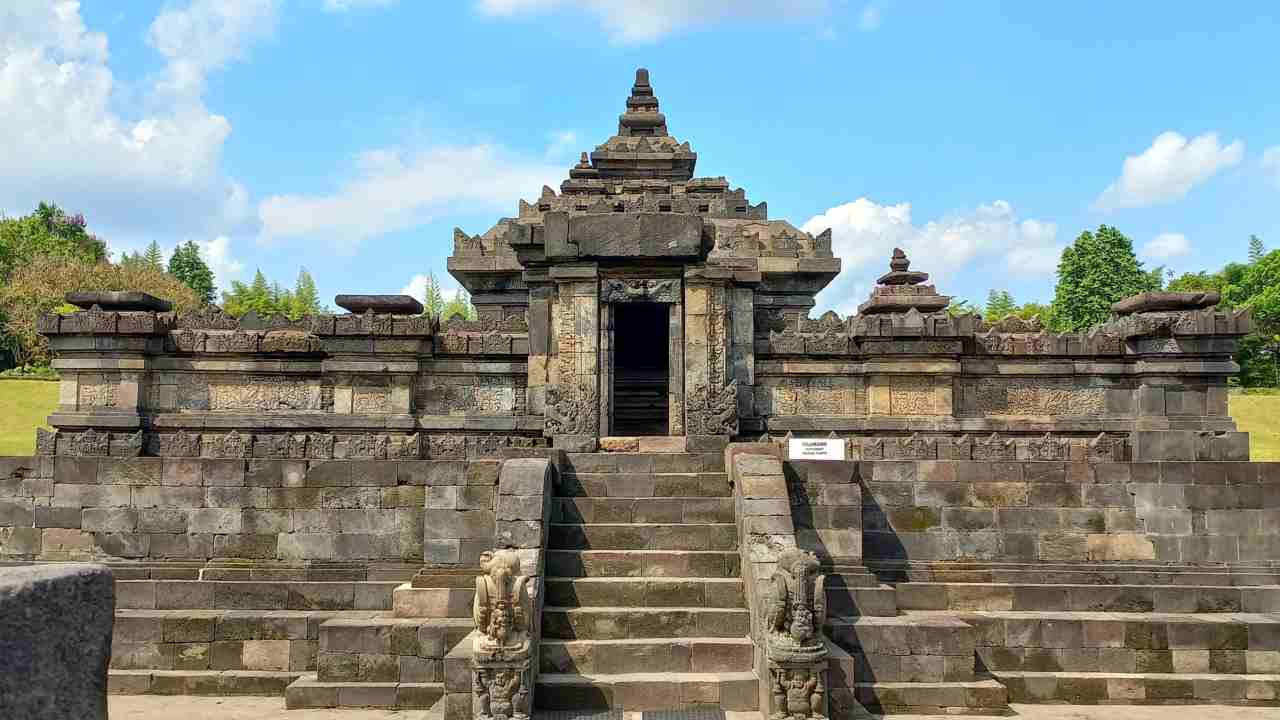
Digging further, the farmer found out that it wasn’t ordinary rock, but part of stone construction. The farmer then reported his finding to the local archaeological office. Excavation further revealed the overall temple. Then, the official agency undertook rehabilitation which was accomplished in 1986.
Since then, Sambisari Temple became one of the cultural tourist objects in Yogyakarta. The temple is unique. Because, unlike other temples that situate at the hilltop or highland, it is beneath the earth’s surface.
Sambisari’s Physical Appearance
Sambisari temple uses solid stone, as in Plaosan, Sojiwan, and Prambanan temples. The overall complex resembles the form of a stadium with a surrounding lawn ramp as its’ spectators’ podium. The main temple body is 7.5 meters high. It stands on a foundation or Batur that takes a square form of 13.65×13.65×2 meter dimension.
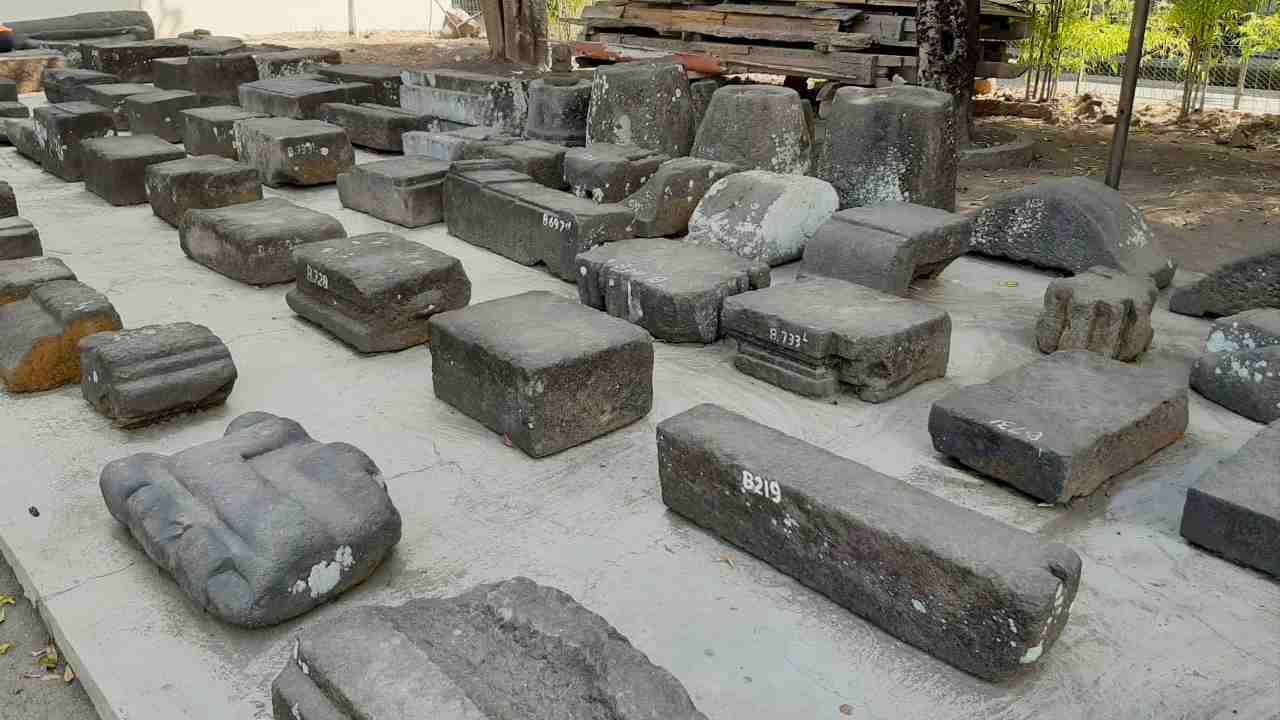
The main temple base also takes a square form of 5 m2 size. A 1.2 m ledge surrounds the main shrine’s foundation that forms a hall. The ledge height causes most of the main shrine’s body covered. People can only see the top of the temple from the outside.
Sambisari Remaining Structure
No ornament on the temple’s base but flowers and shoots fine carvings on the outer wall of the ledge. There are two walls surrounding the main temple and the three perwara (secondary) shrines.
There are stairs in the west to get into the main temple. A couple of dragon’s heads with open mouths are carved on the sides of the stairs. The main shrine is relatively intact. While the other three are demolished, leaving only square foundations of 4.8 m2 size.
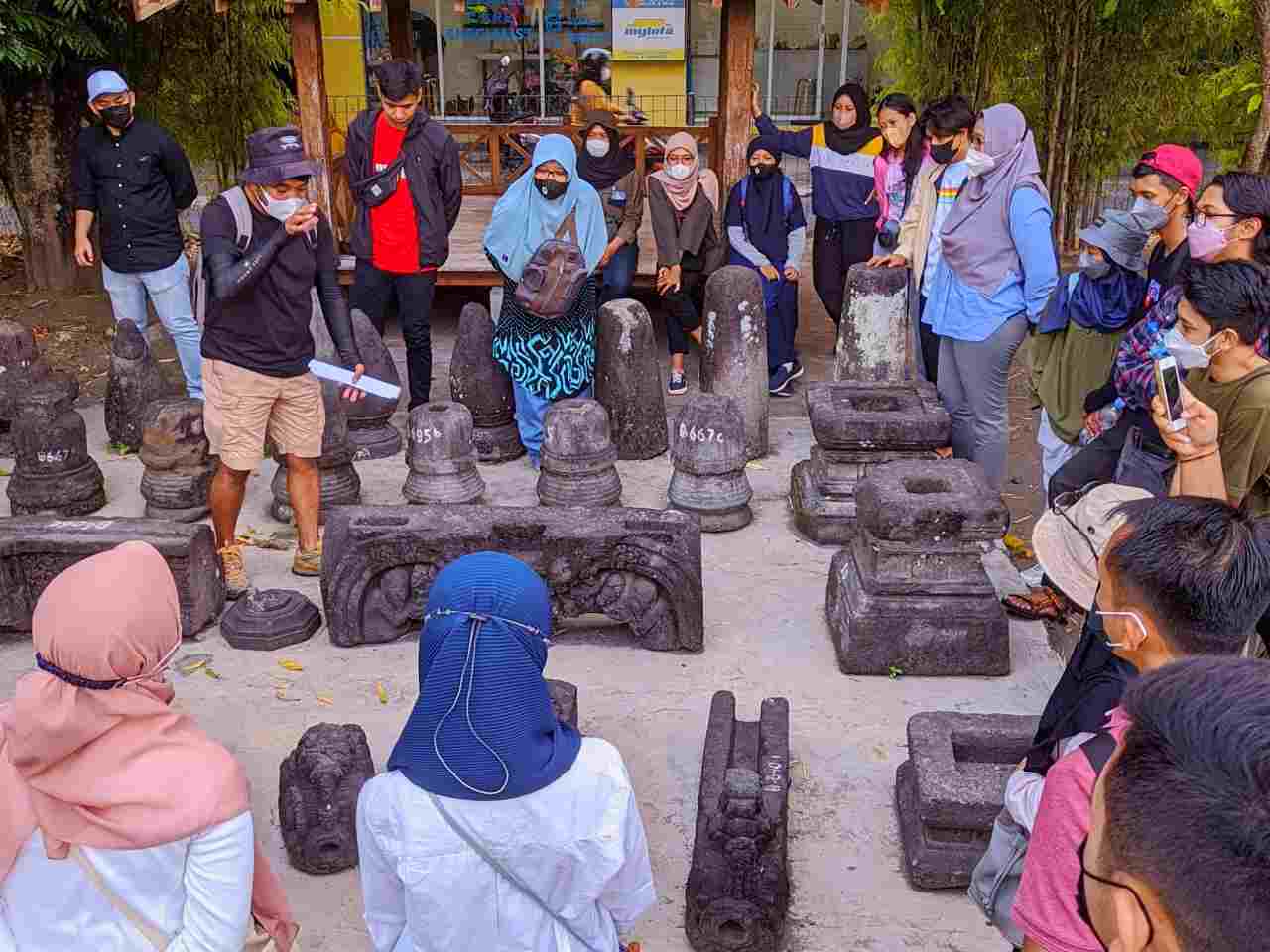
Sambisari Temple Statues
Sambisari is a Hinduism pantheon that was dedicated to Shiva Mahadewa. It marks by the presence of the god Shiva statue or arca on the main temple’s south wall niche. Shiva is depicted as a bearded, two-handed man standing on Padma.
On the north side, a niche holds the statue of Durga Mahisasuramardini, Shiva’s spouse (shakti). It has eight hands and stands on Lembu Nandini (lembu translates to cow). On the east side is the Ganesha statue.
It is an elephant figure, sitting with folded legs on padmasana (lotus throne), with two soles meeting each other. Mahakala and Nandiswara statues are the entrance guards. In main chamber, a big yoni (phallus) statue erects.
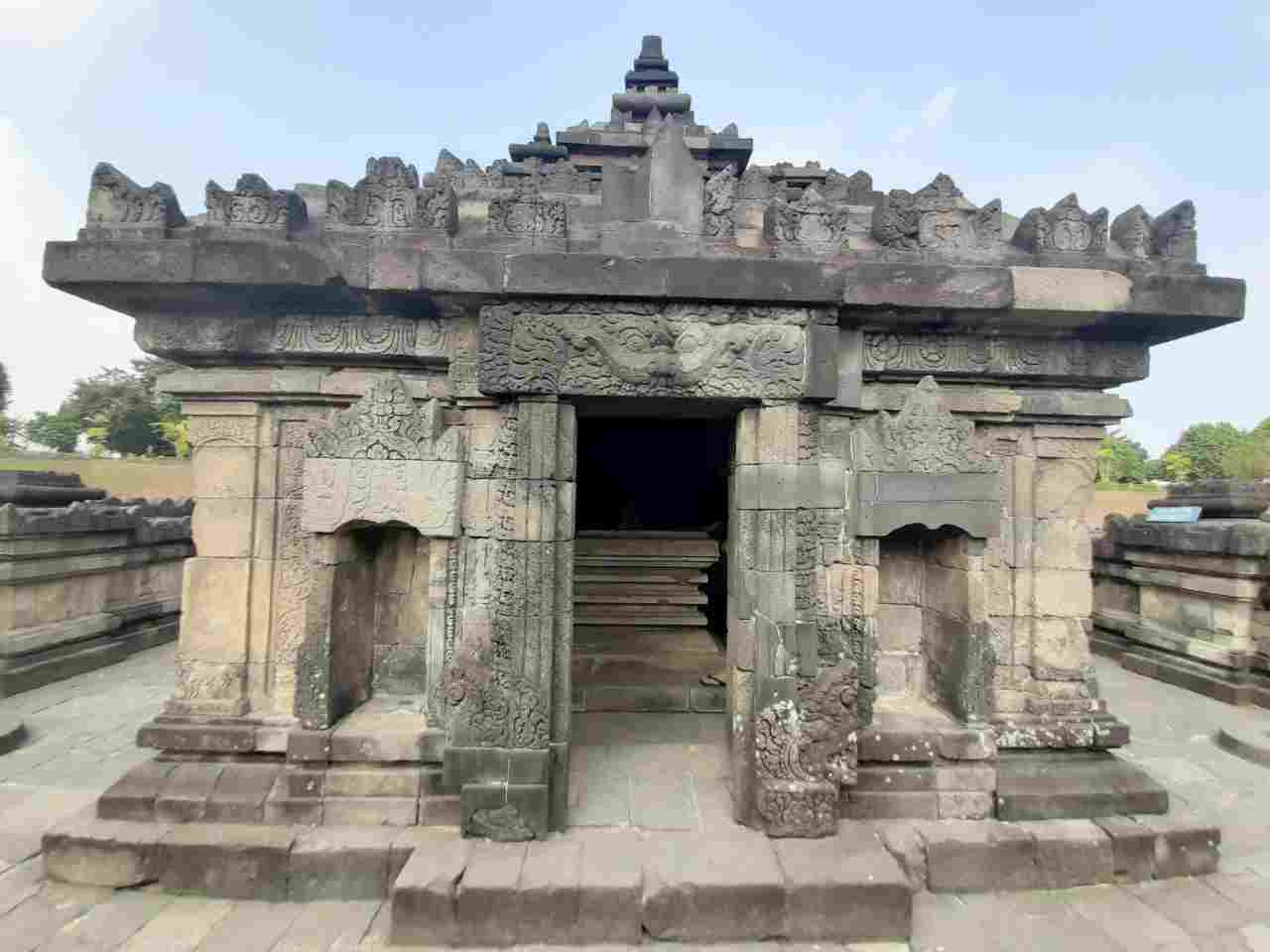
The spout faces north and a dragon ornament decorates under the spout. There is a lingga above the yoni, and a well with a rectangle andesite rock layer below. There is nothing in the well except soil. Yoni and Lingga are the symbols of virility and fertility.
Residential Yet Peaceful Atmosphere
While in the middle of a residential area, Sambisari temple still offers a peaceful atmosphere. The temple situates in an idyllic environment. Its’ remarkable view presents a sacred temple in the middle of a green lawn.
Trees bordering its’ perimeter. The blue sky adorns the background of the picturesque scenery. Its’ unique location offers a gorgeous landscape for photography from the standpoint above.
Nearby: Ratu Boko Palace Guide & Shuttle Bus Information.
Facilities
The temple situates not on the main road. However, it is wide enough to accommodate a bus. There are toilets, garbage bins, gazebos, and seats to accommodate tourists. All of these facilities are free. However, the parking lot is available at Rp5.000 for a car and Rp2.000 for a scooter.
Hungry? There is a legendary Soto Bathok Mbah Karto, only 850 m away to the north. Tourists may enjoy a batok (bowl made of coconut shell) of soto at only Rp6.000, less than $1. The shop is open from 6 AM to 4 PM. Or, go 1 km to the south to Pulen Kopi Ponti. It opens from 7 AM to 8 PM and serves coffee that starts from Rp8.000.
See: YIA Airport Guide & Public Transportation To Downtown.
How To Get To Sambisari Temple
Sambisari temple situates 12 km to the east of Yogyakarta city. Taking Trans Jogja is the cheapest yet most comfortable way to get to Sambisari Temple. Just go to the shelter at Adi Sutjipto Airport. Tourists will only pay Rp3.500 for the ticket.
Or, it takes only half an hour to drive by car or motorcycle. Scooter rent starts from Rp70.000 and car from Rp200.000. From Adi Sutjipto airport, take a left turn (or to the north) at Candi Sambisari Road.
The left turn situates before the gate of the Air Force Academy on the right side. Then, following the road will take tourists to the temple.
See: How To Buy Tourists SIM Card, Price & Internet Package.
Address & Location
Sambisari Temple located in Jl. Candi Sambisari, Purwomartani, Kalasan, Sleman, Yogyakarta 55571.

